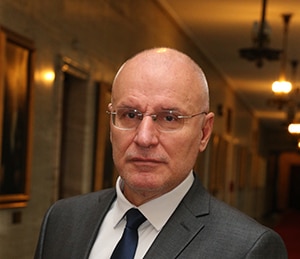The governor of the Bulgarian National Bank speaks with Global Finance.

Global Finance: The Bulgarian National Bank implemented a significant package of measures to spur bank lending and enhance liquidity in the financial system. How well are those measures working to help minimize the economic impact of the pandemic?
Dimitar Radev: We realized we needed to act swiftly and decisively at the very onset of the pandemic to further strengthen the capital position and liquidity of the banking system. To this end, we implemented a package of measures for over 8% of GDP, including capitalization of the 2019 profit, increased liquidity by reducing riskier foreign exposures of commercial banks, and cancellation of the increase of the countercyclical capital buffer planned for 2020 and 2021.
These, in combination with fiscal measures, helped absorb the pandemic shock and alleviate the financial conditions for businesses and households. One of the main instruments we’re using is a moratorium scheme for bank loan payments until March 31, 2021. The incoming data confirm that our banking system continued to perform its intermediation functions smoothly in support of the economy. During the second quarter, which bore the brunt of the shock in the aftermath of the pandemic outbreak, company and household deposits increased by 1.6% and the stock of bank loans to households and small and medium-size enterprises increased by 0.8% and 2.2%, respectively. However, we are fully aware that pandemic-related developments are far from over, and stay ready to deploy additional measures as needed.
GF: How long are the measures that the BNB introduced to deal with the pandemic likely to remain in place?
Radev: The shortest answer is, as long as needed. Of course, we monitor carefully the economic situation and trends in the banking system and in all areas relevant to our tasks and responsibilities as a central bank. The good news is that we know much more today, compared to just months ago, about the economic and financial costs of the pandemic. Nevertheless, uncertainty remains notably high. Until a more stable outlook for the course of the pandemic emerges, we need to stay vigilant and ready to act.
GF: How much do you expect the Bulgarian economy to shrink in 2020 as a result of the pandemic, and what are your predictions for growth next year?
Radev: One thing I can be fairly confident in is that the decline in Bulgaria’s GDP this year will be less severe than initially expected. It is reasonable to assume that our economic trajectory will closely follow, but stay relatively better than, the profile of the euro area. We are now finalizing the work on our updated macroeconomic projections and will publish them in October. Even though our forecasts are usually rather cautious, I would not be surprised to see Bulgaria among the EU’s most resilient economic performers in 2020.
GF: Although “flash GDP” contracted by more than 9% in the second quarter of this year, ING Bank says the contraction wasn’t as big as some expected and predicts that the country is likely to post one of the smallest contractions in GDP in the EU. To what extent is this attributable to the central bank’s actions?
Radev: It sounds strange to consider an economic contraction of that size in somewhat positive terms. But, yes, I share the prediction that the contraction of the GDP in Bulgaria will remain below the EU average. Such an outcome reflects the existence and application of various government and central bank measures aimed at alleviating the negative impact from the pandemic. Without them, the picture would have been different. However, a precise analysis of the contribution of the separate policy measures to our GDP dynamics would require a longer and more detailed data series. We are still very early on in the process, but there will be plenty of such research to publicly communicate in due time.
GF: Heading into the pandemic, how confident were you that the Bulgarian banking sector was strong and well-capitalized?
Radev: The banks in Bulgaria entered the new coronavirus period very well prepared and resilient by any common metrics. At the end of 2019, the banking system had an over 19% CET1 capital ratio and a 270% liquidity coverage ratio. The sectors traditionally maintained high capital adequacy and liquidity have been bolstered further in recent years as a result of the asset quality reviews and stress tests done by the BNB and the ECB. The BNB measures noted above aimed to ensure even more safeguards in the face of the unprecedented nature of risks around the pandemic.
GF: How has the pandemic impacted ial banks’ efforts to integrate or align themselves more closely with the EU financial infrastructure as part of your path toward adopting the euro in early 2023?
Radev: Contrary to some concerns earlier this year, the pandemic situation did not impede our progress toward deeper European integration. It is a rather remarkable achievement that, in this period—despite enormous economic, financial, even political complications following the spread of the pandemic—we managed to successfully complete the all-important projects of entering the Exchange Rate Mechanism II and the Banking Union. Thus, we remained on track toward the next stage, adopting the euro.
An optimal strategy for the country is to aim to stay in ERM II for as short a time as possible. This suggests 2024 as Bulgaria’s year of accession to the euro area. Understandably, however, any such timeline is subject to a substantial degree of complexity and uncertainty involving developments in the economy, finances and the political landscape, both in the euro area and domestically. Therefore, our focus as a central bank is on the quality of the process, meaning that we need to do the right things, rather than focus on a specific deadline.



